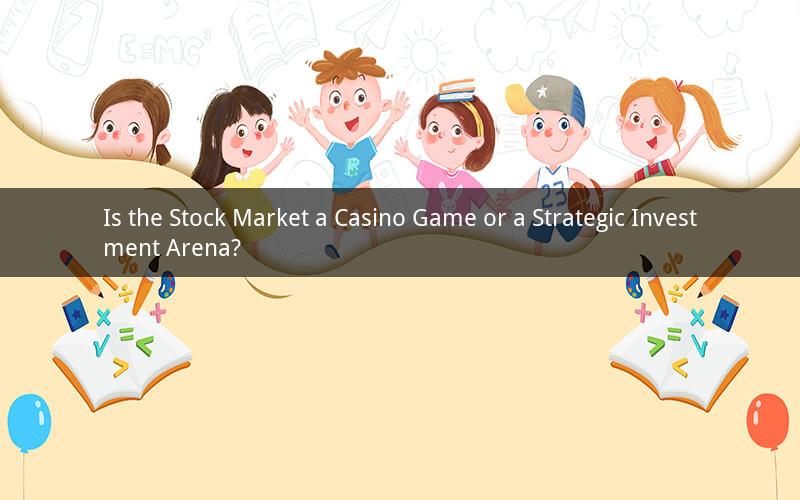
Table of Contents
1. The Allure of the Stock Market
2. The Casino Metaphor: A Closer Look
3. The Strategic Aspect: Investing vs. Gambling
4. Emotional Roller Coasters: The Psychological Aspect
5. Historical Perspectives: From the Stock Market Crash to Modern Times
6. The Role of Technology and Data in Today's Market
7. The Social Impact: Wealth Distribution and Economic Power
8. The Future: Trends and Predictions
1. The Allure of the Stock Market
The stock market has long been a place where dreams are made and broken. It's a place where individuals, from seasoned investors to novices, gather to watch their wealth grow or dwindle. The allure of the stock market lies in its potential for high returns, the thrill of the chase, and the promise of financial independence. But is this grand spectacle akin to a high-stakes casino game, where luck often plays a pivotal role, or is it a strategic investment arena where skill and knowledge reign supreme?
2. The Casino Metaphor: A Closer Look
The comparison between the stock market and a casino game is not without merit. Both involve risk, uncertainty, and the potential for significant gains or losses. In a casino, players place bets on the outcome of games like poker, roulette, or slots, hoping to hit the jackpot. Similarly, in the stock market, investors buy and sell shares, speculating on the future performance of companies. The metaphor, however, fails to capture the nuances of investing, as it oversimplifies the complexities of financial markets.
3. The Strategic Aspect: Investing vs. Gambling
Investing in the stock market requires research, analysis, and a long-term perspective. Investors study financial statements, market trends, and economic indicators to make informed decisions. They may invest in a diversified portfolio, spreading their risk across various assets. In contrast, gamblers in a casino often rely on intuition, luck, or a hunch. The stock market is not a game of chance; it is a marketplace where the price of a stock reflects the collective opinion of all investors.
4. Emotional Roller Coasters: The Psychological Aspect
Both the stock market and casino games can be emotionally taxing. The roller coaster of emotions is palpable in both environments. Investors experience the thrill of a sudden surge in their portfolio's value, only to be followed by the dread of a market downturn. Casino gamblers feel the same intensity, whether they are winning or losing. The psychological aspect of both activities is a critical factor that can lead to impulsive decisions and significant financial losses.
5. Historical Perspectives: From the Stock Market Crash to Modern Times
History is rife with examples of stock market crashes that have caused widespread panic and economic turmoil. The Great Depression of the 1930s, the dot-com bubble burst in the early 2000s, and the 2008 financial crisis are just a few instances where the stock market's volatility has had devastating consequences. However, the stock market has also been a driver of economic growth, innovation, and wealth creation.
6. The Role of Technology and Data in Today's Market
The advent of technology has revolutionized the stock market. Advanced trading platforms, real-time data analytics, and artificial intelligence have made it easier for investors to make informed decisions. However, this technology has also introduced new risks, such as algorithmic trading and market manipulation. The stock market of today is a complex web of interconnected systems, where data is king.
7. The Social Impact: Wealth Distribution and Economic Power
The stock market plays a significant role in wealth distribution and economic power. While it has the potential to create millionaires, it can also exacerbate wealth inequality. The concentration of wealth in the hands of a few can lead to economic instability and social unrest. The stock market's impact on the broader economy is a topic of ongoing debate among economists and policymakers.
8. The Future: Trends and Predictions
The future of the stock market is uncertain, but certain trends are becoming increasingly apparent. Environmental, social, and governance (ESG) factors are gaining prominence, and companies that prioritize sustainability and social responsibility are attracting more investment. Additionally, the rise of cryptocurrencies and decentralized finance (DeFi) could disrupt traditional stock market dynamics.
Conclusion
Is the stock market a casino game or a strategic investment arena? The answer lies in the approach one takes. While it shares similarities with gambling in terms of risk and reward, the stock market is a complex system that requires discipline, knowledge, and a long-term perspective. It is not a game of chance but a marketplace where the smartest and most prepared investors often come out on top.
Questions and Answers
Question 1: What is the difference between investing and gambling in the stock market?
Answer: Investing involves research, analysis, and a long-term perspective, while gambling relies on intuition, luck, or a hunch without considering the underlying fundamentals of the market.
Question 2: Can anyone become a successful investor in the stock market?
Answer: While anyone can become a successful investor, it requires a significant amount of time, effort, and dedication to learn the necessary skills and maintain a disciplined approach.
Question 3: How can an investor mitigate the risks associated with the stock market?
Answer: Investors can mitigate risks by diversifying their portfolio, staying informed about market trends, and maintaining a long-term investment horizon.
Question 4: What role does technology play in the modern stock market?
Answer: Technology has revolutionized the stock market by providing real-time data, advanced trading platforms, and algorithmic trading, which can enhance the efficiency and accessibility of investing.
Question 5: How can the stock market impact the broader economy?
Answer: The stock market can impact the broader economy by influencing consumer confidence, wealth distribution, and economic growth. Its stability is crucial for maintaining economic stability and fostering innovation.